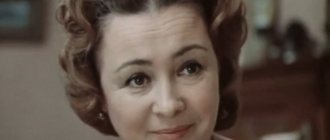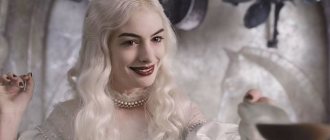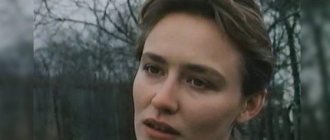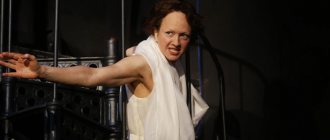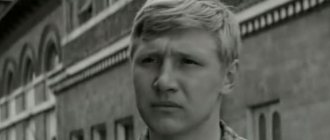Svetlana Alekseevna Borovskaya (b. 1969) is a Belarusian television presenter and actress. In her film career there was only one famous role, which Sveta played in 1997 in the action film “The Deserter”. But on Belarusian television she is a star. An ordinary Soviet girl achieved such success because along her life path she met amazing people who taught her to sincerely love the world - parents, school teachers, her beloved husband. She learned to give her love to the world, and in return became the favorite of millions of Belarusian television viewers.
Father's daughter
Svetlana was born on November 17, 1969 in the town of Molodechno, Belarusian SSR. She, as in the Russian series, is a real “daddy's girl.” There was already an eldest girl in the family, and father Alexey Petrovich dreamed of a son. But Sveta was born, and he began to raise her like a boy. The girl grew up very lively, very small in the village with her grandparents she could herd a cow and stand up for herself on the street. One day she was offended by a well-fed neighbor girl. Sveta ran home, her braids unraveled, her bows untied, and she whispered: “Well, a barrel of dynamite, you’ll still remember me.”
From childhood, dad taught his daughter to feel happiness, taught her to love people and the world around her. And most importantly, he could never punish his pet. He threatened, but never punished. That is why Sveta was ashamed to upset dad, and she always behaved well. Father and daughter loved to go fishing together on Lake Batorino. She could sit by the fire for several hours and wait while dad fished. And their favorite pastime was going to the forest to pick mushrooms.
The father did not give his daughter any special advice; he saw that she was a leader in life and would remain so. And mother Katya tried to influence Svetlana, drove away suitors, and even took away her documents when she learned about her daughter’s intentions to enter a theater institute. Then Alexey Petrovich came to the rescue, found where his wife hid the documents, took her and put her daughter on the train, because he believed when she decisively declared: “Dad, I will still become an artist!”
And many years later, Sveta helped dad survive the tragedy, or rather, they all survived it together. Always optimistic and positive, he once went to the hospital to get an IV, and returned from there not soon and without a leg. In a month he underwent four operations, amputation and clinical death. There were moments when Alexei Petrovich no longer wanted anything, but Sveta made him fight for his life. Now he uses a prosthesis, drives a car and, as always, smiles and jokes.
Svetlana with dad
Every morning Svetlana begins with calling her parents. Every evening ends the same way. She needs to hear them, to understand what mood mom and dad are in.
Svetlana Borovskaya: While our parents are alive, we are children
“God, this is a voice from my childhood, from TV,” this is how the 20-year-old barista reacted, taking an order from Svetlana Borovskaya. We were sitting on the cozy veranda of a small cafe in the capital on Rumyantsev Street. Over the course of two hours, several people greeted my interlocutor. From a friendly: “Svetochka, dear, haven’t seen each other for a hundred years!” To the respectful: “Hello, Svetlana Alekseevna!” - from students of the journalism department, where she has recently been teaching. I also remember an adult man. He said that as soon as his wife starts complaining about the weather or her health, he tells her: “Look at that lady on TV.” And this turns out to be the best recipe against the blues. Borovskaya is not the first celebrity with whom we found ourselves in a public place, but I don’t remember such a benefit.
We agreed to talk about the relationship between children and parents. Therefore, first there was an interview with Svetlana, and then I met with her mother, Ekaterina Dmitrievna, and asked her the same questions.
- You had your first child at a very young age, your second - 8-9 years later. Was it not a shame that your friends were at the dance, and you were at home with a child in your arms?
Ekaterina Dmitrievna: - I don’t regret anything at all. Although I had plans to enter a theater institute, I was cut short in the third round of the creative competition. At that time there were evening courses in Minsk at the Yanka Kupala Theater - I started studying there, but already had a relationship with my future husband, and soon they got married. What young man would tolerate his wife disappearing in the evenings? And then Svetlana was born.
I believe that my children were born at the best time. Children are not an obstacle either in your career or on vacation. When they say that for some reason children have interfered with their lives, I think they are covering up their own laziness. And such a difference in the ages of my daughters is very convenient for me as a mother, because Svetlana has already helped nurse Ruslana.
Svetlana Borovskaya: — My eldest son was born when I was a student. My grandmothers helped me a lot in raising my children. Vova’s son spent the whole summer with his husband’s mother in the Caucasus. But this does not mean that we “threw” children to the older generation. Before my eyes was the example of my parents, when every weekend they came with gifts to the village where I spent my holidays. So do we: at the first opportunity - to the children. And the age difference is great! Volodya took Klim to kindergarten, then to school. And I reminded him from TV that the older brother puts on mittens for the younger brother, takes him by the hand and leads him to school.
— They say that the father is more important for raising a girl, so that she later chooses the “right” men in life, and for a boy, the mother is more important; it is communication with her that teaches one to understand women.
K.D. - It seems to me that it is important that both mother and father participate in raising children. It so happened that Sveta was the only baby in her entire family, she was such a beloved child. I was very worried about her, to the point that I woke up at night to see that she was breathing. With Ruslana I was a calmer mother, as I had already gained experience.
S. B. — My mother taught me all the behavior in society; she raised me to be a woman in matters of friendship and love. And dad raised... without raising. For example, all the children asked their parents for money for ice cream and received 13 or 28 kopecks. My dad always gave me a ruble. At the same time, I never bought three servings of ice cream at once, although I really loved this delicacy and could afford it. Dad's ruble is more than the ability to choose what kind of ice cream to buy. He gave me peace. You know, when children live in a village, one perceives as “theirs” only the space enclosed by a fence, while the other perceives as “theirs” the field, forest, river, everything that they see around. It was precisely this feeling that the whole world belonged to me that my father’s ruble gave me.
In my family, it seems to me that we made an equal contribution to raising our sons. I know for sure that children love us very much, especially during early childhood. Despite how busy we were, we found time for the children. As a mother, I am pleased with how much attention Tolya (Anatoly Kotenev - theater and film actor, Honored Artist of Belarus - Author ) gave to his sons. I remember when Tolya got tired of pushing the stroller, he came up with a device based on an elastic band that allowed him to pull it towards him without using his hands. He pushed it away with his foot, pulled it up with an elastic band, and rocked it like that.
Or here’s another point: we never missed matinees. Once we came to Vova, he was reading a poem, and Tolya and I were crying with emotion. All people are like people, and we are in tears, with a handkerchief in our hands. With Klim it was a different story - he performed, and it so happened that he was always covered by a girl in a pink dress. I whisper to her: “Girl, move away, please,” and Tolya says: “Sveta, shame on you, the girl also has a mother.” We were such a little crazy parents.
“But now you warned me that the sons asked not to talk too much about them and certainly no photographs.”
S.B. - They were born into the family of a popular artist, and then my mother became a famous TV presenter. Since childhood, attention has been drawn to them. I remember how they interviewed us in a park on Lenin Street.
Klim didn’t want to say anything on camera, I saw that he didn’t like it, so I turned it down. The guys are very independent. We even went to the clinic ourselves as teenagers: “Mom, when you come, everyone will start oohing and aahing, letting you in out of turn. We don’t want that.” I chose a school for my children based on the principle that I would not have to cross the road. Volodya studied at a regular school in Malinovka. And Klim already went to another school, where there was a wonderful director Natalya Evgenievna. And she immediately responded to all my “aahs” and said: “Mom, go to work, and here I will study.” I can say for sure that it is not the status that makes an educational institution good or bad, it all depends on the people who work there.
As soon as the sons said that there would be no more interviews and photo shoots, we did not insist. They want to live their lives, not in the shadow of their famous parents. We, of course, want to wrap our children in the duvet of our care for as long as possible. But it's their choice.
— The guys didn’t even consider an acting career as an option?
S.B.—No. The eldest, Volodya, graduated from BSU with a degree in philosophy. He is also a philosopher by nature. I’m emotional, sometimes I say something to him, and he suddenly calmly: “Mom, formulate a question.” And that’s it, he so beautifully lowers the level of my emotions. The youngest, Klim, studies at a linguistic university. By the way, as a child I dreamed of enrolling in Foreign Languages and being a translator. I knew that girls were not very popular as translators, but I was sure that I would also become famous. How interesting it turns out: I fulfilled my mother’s dream of becoming an actress, and my son fulfilled my dream of studying at a linguistic university.
—Are you a strict mother?
K.D. - Yes, probably very much so. I set a kind of curfew for Sveta - I had to be home at 10:45 p.m. So she ran away from the dance... But all this was not to show her power over the child. And especially not from mistrust. This is all out of fear, so that nothing bad happens to the child. I knew that the girls were smart and knew how to behave, but the people around did not only have good intentions.
With age, of course, I have become wiser and I understand that I don’t need to look after adult children at every step.
S.B. - Hardly strict. But I'm the kind of mom who has a lot. I'm learning to let my children go.
-Are you friends?
K.D. - No. I believe that mothers and daughters cannot be friends. We are very close people who trust each other and can talk about different topics. Previously, Sveta said: “I don’t need your advice, Mom,” now she listens more, this phrase has simply disappeared from her. And I'm glad to share my experience. I love my children and grandchildren very much. I still want to help them. If Sveta is on air, I always check to see if everything is okay with the dress. Every year I go to Italy for a month to visit Ruslana. And I help there too; it makes me happy to prepare dinner for them. Friends sometimes tell me: “Why do you need this, live for yourself.” This is how I live for myself! It is important for me that everything is fine with my children and grandchildren, that Sveta comes home from work, and that dinner is prepared at home.
S.B. - No, we are not friends. I was raised to unconditionally respect my elders. Mom can make comments to me, but I can’t make comments to her. But we are very close, dear people. I live with confidence: no matter what happens, I have a mom and dad, and they will always support and understand me. It’s not for nothing that they say: as long as our parents are alive, we are children.
— Svetlana, like my older sister, when I was a child, it seemed to me that my parents loved their younger sister more. And you? And in general, are you friends with your sister?
S.B. - A very important caveat is that this is what you thought in childhood. As I grew up, I realized that my parents loved us equally much, just in different ways, because we are not very similar. As a child, Ruslanka and I could quarrel and even fight with slippers at home. But when one day at school they dared to offend my sister, I grabbed her friend and explained everything to her... We really started to be friends when Ruslana came to study in Minsk, and she lived with us. She helped me a lot with little Klim. My sister has been living in Italy for many years, and the distance has made us even better friends. Once a year she always comes to Belarus, and I go to see her.
Although, probably, the older sister complex lives somewhere deep down. This winter my mother and I went to the dacha. It's cold in the house, they lit the fireplace. I went for more firewood. I go into the house, and my mother warms a blanket in front of the fireplace so that I can wrap myself warmly. Imagine, I’m 49 years old, and my mother warms the blanket for me (tears in my eyes - Author )! I then said: “Mommy, how you love me.”
— Ekaterina Dmitrievna, you became a grandmother at 39 years old. Probably, when you played with your grandchildren, you were mistaken for their mother?
K.D. - It was so. When Vova was born, I took maternity leave for myself. And I prepared well: I had a seamstress friend in Vilnius, she made me a gorgeous suit. And so I walk in it, proudly carry the stroller and receive so many compliments just like a mother, but with such joy I say: “I am a grandmother.”
I love my grandchildren. I have three of them, and all are boys. I remember vacationing with Vova and Klim in Bulgaria. And there are so many things to do and they all want to try it. They especially liked bungee jumping over the sea. I look and think: how can I let the children go? I approached the instructor and said: they say, you need to do the control flight yourself. It was breathtaking with happiness when it rushed over the water at quite high speed. And then, with a calm heart, she let the boys go. And you know, they flew, and my soul went with them. This is such a huge and unforgettable happiness!
— Svetlana, do you think it’s possible to help adult children financially?
S.B. — It’s possible if the parents have the opportunity and the children work themselves. And this is one of the advantages of early motherhood. The children have grown up, and you have the peak of your career, good earnings. Why not help both children and elderly parents?
—What did you learn from your mother?
S.B. —I wanted to be as caring as my mother. You know, she breathed into her socks to keep them warm for us. I did exactly the same thing, but very quickly my sons said: “Mom, that’s enough already...”
- Let's imagine that tomorrow one of the sons will say that you will soon become a grandmother...
S.B. - I will be very glad. I learned not only to calmly perceive my age, but with gratitude: I live, and everything is enough for me. But there was a problem with accepting age. I was very worried for 40 years. Have you noticed how they say: she is 35, she is 37, but she is “already 40.” This is the limit when you move from a young woman to the adult category. I probably spent a year half-heartedly negotiating with myself: “Baby, be quiet, go crazy slower.” My biggest fear is to look ridiculous at my age. I would like to live to a ripe old age in good health; I am very interested in how the lives of my children, grandchildren, friends, and colleagues will turn out.
— When you agreed on the interview, you said: keep in mind that there will not be an ideal picture of parent-child relationships. Does this mean that you have misunderstandings?
S.B. - Of course. I can be offended by my sons. But here’s what I’ve come to: parents are to blame for problems with children. Therefore, if we argue a little, I am the first to make up. I am also the first to make peace with my mother.
— What character traits of your parents would you like to receive and pass on as an inheritance?
S.B. - Everything I admire about them! My dad's leg was amputated, but he was given a prosthesis, he drives a car, lives as if nothing had happened. Wonderful social workers come to him, my classmate helps, and I come every week. Our mother is also very caring, and I love her very much.
R.S. When I asked Svetlana for Ekaterina Dmitrievna’s phone number, she immediately dictated it, and did not start looking for the number in the phone’s address book, as 90% of us do. “I know the home telephone numbers of parents and children by heart,” she explained.
Oksana YANOVSKAYA
Photo by Evgeny PESETSKY and from the personal archive of Ekaterina and Svetlana Borovsky
School years in rainbow colors
In 1976, Sveta went to the first grade of a specialized educational institution with in-depth study of the English language, now it is gymnasium No. 6 in the city of Molodechno. The girl began her studies at the age of six; she turned seven a little later, in November. But her parents decided that Svetlana had nothing to do in kindergarten and sent her to school, so she ended up being the youngest in the class.
Borovskaya, as now, remembers that sunny morning of September 1, when she was waiting for her friend Zhanna Khrustaleva at the neighboring house. The first-graders held hands and went to their first holiday - a school assembly. So all ten school years passed together.
The first teacher, Lyudmila Stanislavovna Okladnikova, became Sveta’s ideal. She had a thick braid wrapped around her head, an intelligent, quiet voice, a snow-white blouse and beautiful earrings. She never screamed, never lost her temper, and never grudged high fives or praise. She never humiliated even the most notorious loser. This is an amazing quality in a teacher - to see the personality in all children.
In elementary school, everything was fine with her studies, but from the fourth grade, not every subject was easy for Svetlana. In languages, history and literature I received only “excellent” marks, but I was not good at exact sciences. It was a nice thing for her to do to copy off the honors students’ homework during recess. She also didn’t really respect chemistry, she collected 25 kopecks from the kids and asked the chemistry teacher to leave early from class so that she could order hot lunches for the whole class in the school cafeteria.
But Borovskaya did not miss a single club at school - she sang in a vocal group, was fond of needlework, played in the theater, and studied drawing. And of course, an October child, a pioneer, a Komsomol member - full of social work. In general, the usual happy childhood of a Soviet child.
Sveta loved going to school and looked forward to September 1 every time at the end of the summer holidays. I considered this day a great holiday, but not because I wanted to study. But because at school everything was interesting to her - friends, peers, noise, din, bells, breaks. All ten school years passed for Borovskaya in rainbow colors.
In high school, Svetlana was again lucky with a wonderful class teacher, Tatyana Mikhailovna, who taught English. The teacher was distinguished by her exactingness both towards herself and those around her. Although Sveta was still a child then, she remembered well that Tatyana Mikhailovna always appeared in front of her students only with an impeccable hairstyle and well-groomed hands. For Borovskaya, she became a role model.
And Tatyana Mikhailovna was never satisfied with second place in anything. If her class was not the first in some school competitions or shows, she folded her beautiful hands and said: “It’s bad, my dears. Very bad". And even when the guys took first place, she argued that they could have done even better. Thanks to this approach, both Sveta Borovskaya and many of her classmates achieved the highest achievements.
And the class in which Svetlana studied was very friendly. Even after many years they do not forget each other. On the first Saturday of February, according to the good old Soviet tradition, alumni gather for reunions. Borovskaya never tires of repeating in interviews: “Remember your teachers and classmates, find a friend for a friend and never forget. There is no future without the past!”
Career
Having received a certificate of secondary education, Svetlana entered the Belarusian Theater and Art Institute. She was lucky, she got into the course of the famous Belarusian director and actor Valery Maslyuk.
But after graduation, Svetlana’s film career did not work out. She played only one well-known role - the wife of a paratrooper officer in the film "The Deserter".
But her path on Belarusian television was very successful. For more than twenty years, Sveta has been hosting the program “Good morning, Belarus!” and “Good afternoon, Belarus!” on the First National Channel. She stays in the frame perfectly, and viewers are always delighted with her programs. Borovskaya is not just a popular presenter; she has long been assigned the status of being the face of Belarusian television.
Recently, Svetlana has her own television program, “There is a Way Out,” where she communicates and interviews celebrities.
Sveta is also often invited to host large concerts, important state and holiday events. She is also involved in social activities a lot; Borovskaya is the Goodwill Ambassador to Belarus for the United Nations Program to Combat AIDS.
Confident steps towards acting
Then the girl entered GITIS, where she improved her acting skills in the workshop of Vladimir Andreev.
While studying, Olga began acting in student productions , including: “The Idiot”, “Trampled Petunias”, “Demons”, “Ivanov”. At the same time, Borovskaya appeared on the stage of the Ermolova Theater.
In 2011, Olga Borovskaya received one of the main roles in Nikolai Roshchin’s play “The Raven,” staged at the ARTO Theater. In 2012, the girl received a diploma, as well as an honorary prize at the reading competition named after. Ya. Smolensky, held between theater universities.
Borovskaya brilliantly read an excerpt from the play “Mother’s Field” by Chingiz Aitamatov. In 2020, Olga joined the theater troupe. Vakhtangov , where she played in such productions as:
- "Run";
- "Eugene Onegin";
- "Othello";
- "Minetti";
- “Imaginary patient”;
- "Sergiev and the town."
Now Olga Borovskaya continues to appear on the stage of this theater, earning applause from the audience. In total, the artist already has more than two dozen works in her creative collection.
Personal life
In her first year at the Institute of Light, she met her future husband, the already famous actor Anatoly Kotenev, who played in the films “The Secret Fairway” and “Special Forces Squad.” Mom was shocked at first; she wanted her daughter to marry some French diplomat. But prohibitions are powerless against true love.
In 1989, Svetlana and Anatoly got married. They managed to create an extremely strong family for such creative individuals. The couple have lived together for more than a quarter of a century. But most importantly, they raised wonderful sons - Vladimir (1989) and Klim (1998). The eldest son is a very serious boy, he graduated from the Faculty of Philosophy of BSU (Belarusian State University), reads books by authors that Sveta has never even heard of.
Svetlana is a wonderful mother. According to her husband, there are no better mothers in the world than Borovskaya. She is also an amazing wife, the most important thing is that she is reliable. When Anatoly did not have a job in the cinema, the family began to face quite difficult financial times. The actor even had to start making and selling jewelry. Not once did Sveta allow herself to even hint to her husband that someone knew how to earn money, while he was sitting at home. She's too smart to say such nonsense. On the contrary, Svetlana appreciated that her husband was not lying on the sofa complaining about his fate, but was trying to do something.
It so happened that Svetlana had a job, but Anatoly did not. And both spouses reacted completely normally to the fact that Sveta went to work in the morning, and her husband stayed at home and took care of the housework. He fed the children, took them to kindergarten, then picked them up, and while the boys were away, he sat down and made his decorations. But still, this income was not enough, and Anatoly decided to go to Moscow. His wife, although with difficulty, supported him.
Now everything is fine with their finances, they have an apartment in Minsk and a country house in Kuchki in the Vileika region. A country house was Anatoly’s dream, the couple worked long and hard together towards its realization. Svetlana organized the entire life there herself, and she did it very beautifully.
